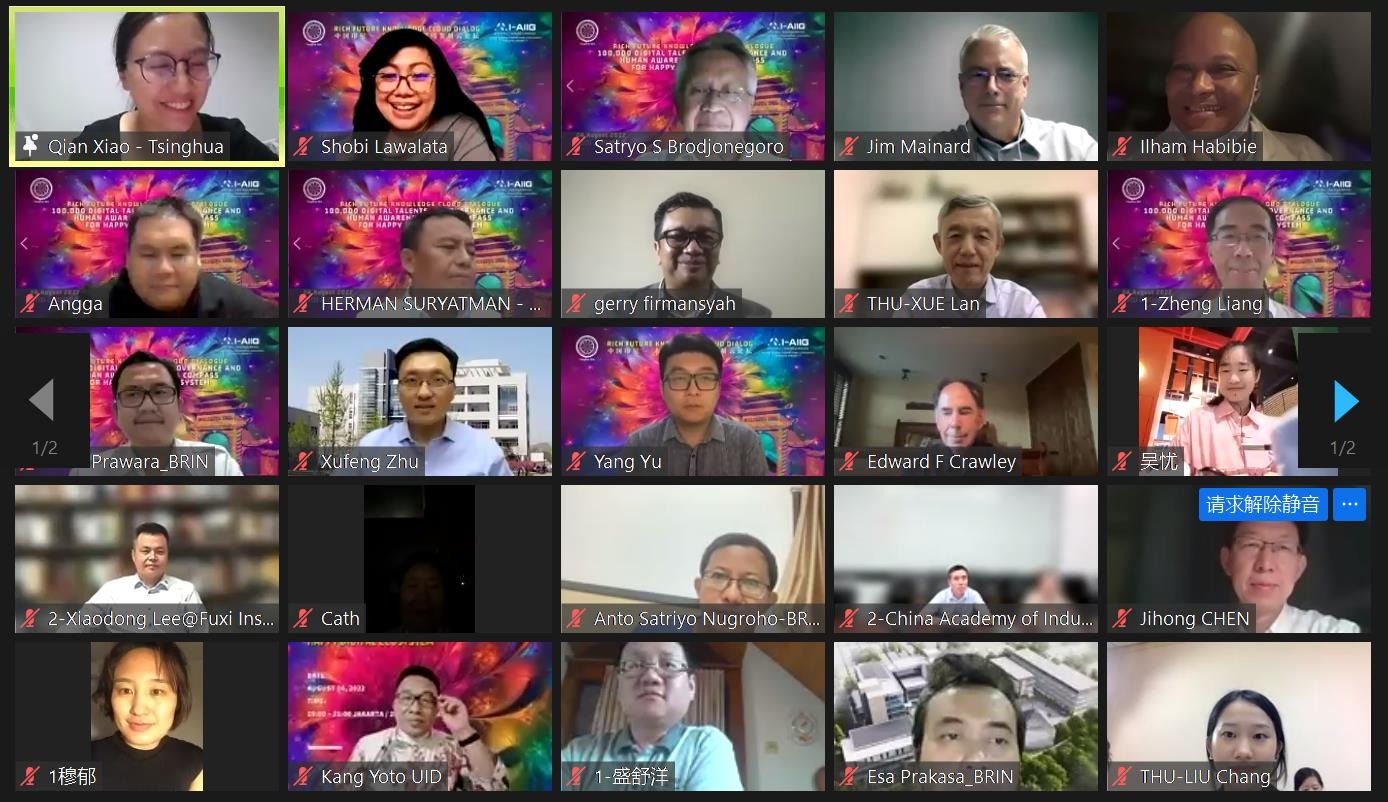
The Institute for AI International Governance (I-AIIG) of Tsinghua University and Tsinghua Southeast Asia Center (TSEA) have cooperated to address the prospects and challenges of the digital ecosystem in China and Indonesia, according to a Cloud Dialogue held on August 24, 2022. The event was moderated by XIAO Qian, Vice Dean of I-AIIG.
Participants include senior policy-makers, experts, researchers and practitioners in digital industry in China and Indonesia. The event comprised multiple panel discussions on a wide range of topics related to digital talents cultivation, data transportation and regulatory, and AI governance, which are all the key topics in the digital transformation in both two countries.
“As large developing countries, China and Indonesia actively promote digital transformation in all fields, and the demand for digital talent is growing rapidly. At the same time, the urgency and importance of data and AI governance have become increasingly prominent in the digital transformation process,” said WANG Xiqin, President of Tsinghua University, “it is imperative to seek common ground and explore international cooperation in building a sustainable digital ecosystem, and Tsinghua University remains steadfast in contributing to this.”
China’s Global Development Initiative, put forward by President XI Jinping, is in response to challenges in the era of COVID-19, and in particular to the expectations of developing countries for accelerating their post-pandemic recovery. In the same spirit, Indonesia’s New Era Bali Kerthi Roadmap is putting these ideas into practice by harnessing the power of big data. The initiative and the roadmap are focused on Sustainable Development Goals, and the inclusive digital economy has been identified among the priorities.
Airlangga Hartarto, Coordinating Minister for Economic Affairs of Indonesia, pointed out in his video speech that the digital economy presents new opportunities for Indonesia’s economic growth, and inclusive and sustainable digital economy growth is a priority. “However, key digital challenges still remain - the shortage of professional digital talent, the lagging research and innovation in digital technologies and applications, and the inadequate establishment of digital and physical infrastructure, which global efforts need to address,” he said.
“Data is the core factor of digital economy,” XUE Lan, Dean of I-AIIG emphasized in the keynote speech. The 2019 Frost & Sullivan report indicates data supports the future, and 90% of the revolution depends heavily on the flow and use of data. Regarding this, XUE Lan proposed four suggestions on cross-border data flows: to accelerate the cooperation of cross-border data governance among nations; improve technical governance level; develop domestic cross-border data flow regulations as well as create an open and orderly cross-border data flow environment and bridge the digital divide.
In the process of digital transformation, AI has injected vitality into economic and social development bringing unprecedented opportunities for human life. But just as a coin always has two sides, the development of AI also faces a series of challenges, of which AI governance cannot be ignored.
“There is an urgent need to speed up the improvement of human-centered governance ability of AI; strengthen the research on legal, ethical and social issues related to AI in addition to establishing and improving laws, regulations and ethical systems to develop a digital ecosystem to ensure the healthy development of AI,” commented Satryo Soemantri Brodjonegoro, President of the Indonesian Academy of Sciences. He also emphasized the urgency and importance of international cooperation in the of AI governance, and believed that no region or country could become an "isolated island" to copy with this global issue.
Nadiem Makarim, Minister of Education, Culture, Research, and Technology of Indonesia, believes the issues in AI governance are the inadequacy in social, regulatory, and educational approaches to the technology that propagates disinformation and digital manipulation. “The cultivation of digital literal talent across all disciplines is essential in improving AI governance, we need to unbundle higher education and remove the barriers between disciplines and sectors,” he added.
Edward Crawley, Academic Advisor of Tsinghua Southeast Asia Center, in his closing remarks, reaffirmed the critical role of the universities in bridging the digital gap and boosting the global digital transformation. He encouraged the universities to cooperate closely with the government and the industry, and actively participated in the international cooperation in this field.
Tsinghua University adheres to contributing to sustainable development and international cooperation. That is the reason the university established the Southeast Asia Center in 2018 as a platform for cooperation and exchange between China and Southeast Asian countries and established the Institute for AI International Governance in 2020, aiming to research on major theoretical issues and policy needs regarding global AI governance and encourage international cooperation in this area.
LI Jinliang, Dean of International Affairs of Tsinghua University, gave the closing remarks and said that he was happy to see the two institutes make joint efforts to address the digital transformation challenges in China and Indonesia. “More effort is needed to work out global solutions for the digital divide. It is important that experts and scholars from different countries put aside differences and disagreements, and work together to achieve digital transformation as well as sustainable development,” LI concluded.